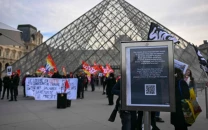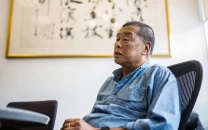Analysis: How America's Muslims, other minorities vote
The immigrant and minority communities do not reflect the deep divisions visible among the mainstream American voters

Voters wait in line during voting for the US presidential election in the Brooklyn borough of New York on November 8, 2016. PHOTO: REUTERS
Latino voters, who were a target of Donald Trump‘s most frequent scorn, are delivering a stunning rebuke to the Republican candidate. Latin Decisions, which track nationwide Latino polling trends, projects that 79% Latino voters are voting for Hillary Clinton while just 18% are expected to vote for Trump, the lowest Latino vote for any Republican presidential candidate in any election in the past 30 years.
The Polish community’s slight majority supports Trump, while majority of Irish Americans support Clinton, even though Trump still enjoys significant support of nearly 40% Irish voters.
What impact will US elections have on Pakistan?
According to National Asian Americans Survey, Trump barely makes it to double digits among Indian-American registered voters. With his favourability rating at 11%, he is way behind Clinton’s 71%, who enjoys solid support from minority communities such as Muslims, Sikhs, and Christians.
The right-leaning little known Republican Hindu Coalition, considered close to Bharatiya Janata Party, threw a lavish Bollywood item numbers-laced rally in New Jersey on October 15 where Trump proudly declared his "love for Hindus and India".
Even though majority of 7,000 or so people in the audience showed up at the rally to watch dance numbers of Bollywood beauties, the event left Trump pumped up in the illusion that he enjoyed the support of every Indian. But not so much! His selective love for Hindus and brushing the entire India with the Hindu brush offended many Indian minority voters.
“India is not only for Hindus; India has Sikhs, Christians, Muslims, Buddhists, and many more. Trump has to understand that. India has a large Muslim population. Muslim population is more in India than in Pakistan. Trump does not know that. Talk is cheap but it is difficult to deliver,” Sant Chatwal, an Indian American hotelier told a press conference in New York on November 2.
The Muslim Americans are also determined to leave an imprint on the elections with its consequences reaching far beyond the American shores. The possible Trump victory is making many Americans consider moving out of the US and warming up a few places around the globe for election-induced immigration.
Hillary Clinton distantly related to French president, claims book
Mashable reported back in March this year that Google searches for "how to move to Canada" spiked to record levels hours after Donald Trump won primaries in seven states on Super Tuesday. By the next day, @GoogleTrends announced on Twitter that searches for "move to Canada" were higher than any time in Google history.
Inishturk, an under-populated Irish island, is one such place inviting American citizens to consider relocating. Cape Breton, another island off Canada’s east coast, is also offering a “warm welcome” to disenchanted Americans.
A website called Cape Breton If Donald Trump Wins popped up earlier this year, offering island’s photos and helpful links to immigration resources, and an earnest plea: "We always rank high on travel magazine lists of beautiful islands. But we are experiencing a bit of a population problem at the moment. We need people. We need you!" The island already has a small Muslim community and is home to at least one mosque.
While Cape Breton may need new residents and there may be many Americans, including some Muslims, who may consider it as their new abode, majority of American Muslims are determined to flex their political muscle and join efforts to defeat Trump.
Muslim voters’ strength is a very small percentage of the overall American registered voters. The US Council of Muslim Organisations announced on November 2 that it had registered more than 1 million Muslim voters. Officials of the organisation said that an October poll had indicated that 86% of Muslims registered intended to vote on November 8.
Muslim voters make up a noticeable chunk of the electorate in swing states, including Michigan, Virginia, Florida, and North Carolina. Florida’s Muslim vote for George W Bush, which was greater than his margin of victory, is sometimes credited with making Bush president in 2000.
Trump says he would not admit refugees without community support
The Muslim community is aware of the power of its vote in swing states and has been politically much active than in the past elections. But it still lacks a national leadership, a cohesive unanimous agenda and a unified strategy.
Its organisational weaknesses aside, the Muslim community understand the high stakes this election has for it. According to an opinion poll that Muslims civil rights group the Council on American Islamic Relations released in early October, an overwhelming 72% Muslim voters said they would vote for Clinton despite reservations. Trump enjoyed only 4% Muslim voters support. Pakistani community leaders in New York estimate that more than 80% Pakistani American voters would vote for Clinton while a tiny minority would vote for Trump. Interestingly enough, US-based Pakistani Christians have emerged as the biggest voting block within the community that supports Trump.
Clinton understands the importance of Muslim vote and has been carefully courting the community. Part of its unprecedented outreach to court Muslim voters, the Clinton campaign did something Barack Obama as a candidate could not think of during his campaign in 2008 or 2012 – releasing an ad just days before election invoking Islam and featuring Pakistani American Khizr Khan, the father of US soldier Humayun Khan, who was slain fighting in Iraq in 2004. The ad, aired in seven battleground states, has Khan telling the story of his son’s death while saving his comrades, saying, “He was 27 years old, and he was a Muslim American. I want to ask Mr Trump, would my son have a place in your America?”
The November 8 ballot would not just have profound impact on America’s Muslim population but all those minorities that are searching their American dream. The most probable victory for Clinton may not change America or the world much, which may witness four more years of Obama’s eight years. But a Trump tumult after an unexpected victory may change America and the world at large beyond recognition.
The writer is the Co-Director of Center for Community and Ethnic Media at Graduate School of Journalism of City University of New York. Follow him on Twitter @JehangirKhattak



















COMMENTS
Comments are moderated and generally will be posted if they are on-topic and not abusive.
For more information, please see our Comments FAQ